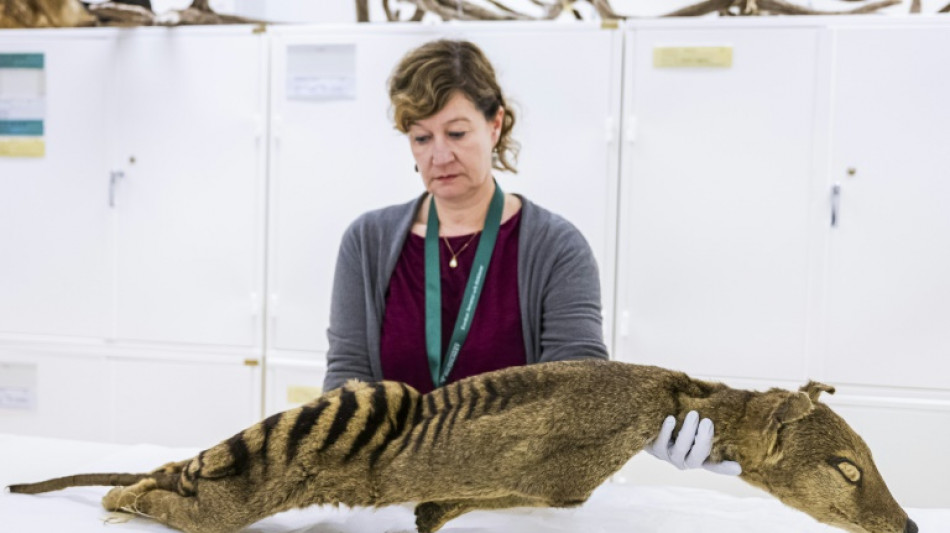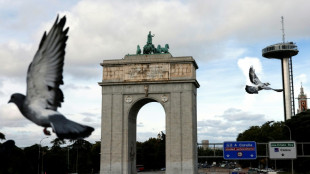
-
 Japan election results confirm super-majority for Takaichi's party
Japan election results confirm super-majority for Takaichi's party
-
Unions rip American Airlines CEO on performance

-
 New York seeks rights for beloved but illegal 'bodega cats'
New York seeks rights for beloved but illegal 'bodega cats'
-
Blades of fury: Japan protests over 'rough' Olympic podium

-
 Zelensky defends Ukrainian athlete's helmet at Games after IOC ban
Zelensky defends Ukrainian athlete's helmet at Games after IOC ban
-
Jury told that Meta, Google 'engineered addiction' at landmark US trial

-
 Despite Trump, Bad Bunny reflects importance of Latinos in US politics
Despite Trump, Bad Bunny reflects importance of Latinos in US politics
-
Australian PM 'devastated' by violence at rally against Israel president's visit

-
 Vonn says suffered complex leg break in Olympics crash, has 'no regrets'
Vonn says suffered complex leg break in Olympics crash, has 'no regrets'
-
YouTube star MrBeast buys youth-focused banking app

-
 French take surprise led over Americans in Olympic ice dancing
French take surprise led over Americans in Olympic ice dancing
-
Lindsey Vonn says has 'complex tibia fracture' from Olympics crash

-
 US news anchor says 'hour of desperation' in search for missing mother
US news anchor says 'hour of desperation' in search for missing mother
-
Malen double lifts Roma level with Juventus

-
 'Schitt's Creek' star Catherine O'Hara died of blood clot in lung: death certificate
'Schitt's Creek' star Catherine O'Hara died of blood clot in lung: death certificate
-
'Best day of my life': Raimund soars to German Olympic ski jump gold

-
 US Justice Dept opens unredacted Epstein files to lawmakers
US Justice Dept opens unredacted Epstein files to lawmakers
-
Epstein taints European governments and royalty, US corporate elite

-
 Three missing employees of Canadian miner found dead in Mexico
Three missing employees of Canadian miner found dead in Mexico
-
Meta, Google face jury in landmark US addiction trial

-
 Winter Olympics organisers investigate reports of damaged medals
Winter Olympics organisers investigate reports of damaged medals
-
Venezuela opposition figure freed, then rearrested after calling for elections

-
 Japan's Murase clinches Olympic big air gold as Gasser is toppled
Japan's Murase clinches Olympic big air gold as Gasser is toppled
-
US athletes using Winter Olympics to express Trump criticism

-
 Japan's Murase clinches Olympic big air gold
Japan's Murase clinches Olympic big air gold
-
Pakistan to play India at T20 World Cup after boycott called off

-
 Emergency measures hobble Cuba as fuel supplies dwindle under US pressure
Emergency measures hobble Cuba as fuel supplies dwindle under US pressure
-
UK king voices 'concern' as police probe ex-prince Andrew over Epstein

-
 Spanish NGO says govt flouting own Franco memory law
Spanish NGO says govt flouting own Franco memory law
-
What next for Vonn after painful end to Olympic dream?

-
 Main trial begins in landmark US addiction case against Meta, YouTube
Main trial begins in landmark US addiction case against Meta, YouTube
-
South Africa open T20 World Cup campaign with Canada thrashing

-
 Epstein accomplice Maxwell seeks Trump clemency before testimony
Epstein accomplice Maxwell seeks Trump clemency before testimony
-
Discord adopts facial recognition in child safety crackdown

-
 Some striking NY nurses reach deal with employers
Some striking NY nurses reach deal with employers
-
Emergency measures kick in as Cuban fuel supplies dwindle under US pressure

-
 EU chief backs Made-in-Europe push for 'strategic' sectors
EU chief backs Made-in-Europe push for 'strategic' sectors
-
Machado ally 'kidnapped' after calling for Venezuela elections

-
 Epstein affair triggers crisis of trust in Norway
Epstein affair triggers crisis of trust in Norway
-
AI chatbots give bad health advice, research finds

-
 Iran steps up arrests while remaining positive on US talks
Iran steps up arrests while remaining positive on US talks
-
Frank issues rallying cry for 'desperate' Tottenham

-
 South Africa pile up 213-4 against Canada in T20 World Cup
South Africa pile up 213-4 against Canada in T20 World Cup
-
Brazil seeks to restore block of Rumble video app

-
 Gu's hopes of Olympic triple gold dashed, Vonn still in hospital
Gu's hopes of Olympic triple gold dashed, Vonn still in hospital
-
Pressure mounts on UK's Starmer as Scottish Labour leader urges him to quit

-
 Macron backs ripping up vines as French wine sales dive
Macron backs ripping up vines as French wine sales dive
-
Olympic freeski star Eileen Gu 'carrying weight of two countries'

-
 Bank of France governor Francois Villeroy de Galhau to step down in June
Bank of France governor Francois Villeroy de Galhau to step down in June
-
Tokyo stocks strike record high after Japanese premier wins vote


RNA recovered from extinct animal in world first
Scientists have for the first time recovered RNA from an extinct species, the Tasmanian tiger, raising hope for the resurrection of animals once thought lost forever, Stockholm University researchers told AFP.
"RNA has never been extracted and sequenced from an extinct species before," said Love Dalen, a Stockholm University professor of evolutionary genomics who co-led the project.
"The ability to recover RNA from extinct species constitutes a small step (toward) maybe being able to resurrect extinct species in the future," he said.
Dalen and his team were able to sequence RNA molecules from a 130-year-old Tasmanian tiger specimen preserved at room temperature in Sweden's Museum of Natural History.
With this they were able to reconstruct skin and skeletal muscle RNA.
RNA is a molecule that is used to convey information from the genome to the rest of the cell about what it should do.
"If you're going to resurrect an extinct animal, then you need to know where the genes are and what they do, and in what tissues they are regulated," Dalen said, explaining the need for knowledge about both DNA and RNA.
The last known living Tasmanian tiger or thylacine, a carnivorous marsupial, died in captivity in 1936 at the Beaumaris Zoo in Tasmania.
After European colonisation of Australia, the animal was declared a pest and in 1888 a bounty was offered for each full-grown animal killed.
Scientists have focused their de-extinction efforts on the Tasmanian tiger as its natural habitat in Tasmania is largely preserved.
- 'Exciting idea' -
Daniela Kalthoff, in charge of the mammal collection at the Museum of Natural History, said the idea of possibly resurrecting the Tasmanian tiger was an "exciting idea".
"This is a fantastic animal and I would love to see it live again," she said, demonstrating the black-and-brown striped skin the researchers used in their study.
Their findings also have implications for studying pandemic RNA viruses.
"Many of the pandemics that have happened in the past have been caused by RNA viruses, most recently the coronavirus but also ... the Spanish flu," Dalen explained.
"We could actually go and look for these viruses in wild animal remains stored in dry museum collections. That might actually help us understand the nature of pandemics and where pandemics come from," he said.
The study opens the door to using museum collections in this new way.
"There are millions and millions of dried skins and dried tissue from insects, mammals and birds and so on in museum collections around the world, and one could actually now go and recover RNA from all these specimens," Dalen said.
G.Stevens--AMWN



